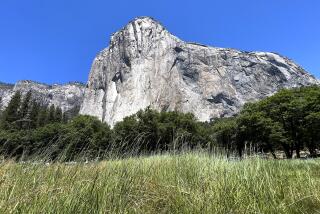National Park Service Stalls Watercraft Ban
- Share via
WASHINGTON — The National Park Service on Tuesday reversed decisions by three national parks to permanently ban personal watercraft from their waterways.
Those parks--Gulf Islands National Seashore in Florida and Mississippi, Padre Island National Seashore in Texas and Cape Lookout National Seashore in North Carolina--are among eight parks that will temporarily prohibit access for personal watercraft (known by trade names such as Jet Ski, Wave Runner and SeaDoo) beginning Monday.
Personal watercraft are high-speed, gasoline-powered vessels, usually less than 16 feet long.
Permanent decisions about the use of personal watercraft in these parks will hinge on assessments of their impact on wildlife and visitors and on public comment.
At the same time, the Park Service announced it would comply with a court order and permanently close five other parks Monday to personal watercraft and other small boats. Whiskeytown National Recreation Area north of Redding is in this category.
The announcement highlights the mounting tension between environmentalists and recreation groups over the use of national parks and other treasured public lands. Environmentalists complain that the noise and pollution from the machines spoil the natural surroundings and erode the quality of the experience for many visitors. But recreation enthusiasts argue that they too have a right to enjoy the public lands.
This is not the first time that the Bush administration has faced environmentalists’ ire for its efforts to appease recreation groups. Bowing to pressure from the snowmobile industry, the Interior Department is reconsidering a permanent ban on snowmobiles in Yellowstone National Park.
The Monday deadline for closing these areas to personal watercraft, at least temporarily, was required by a federal court order as a settlement of a lawsuit brought by Bluewater Network, a San Francisco-based environmental group.
Environmentalists criticized the National Park Service for leaving open the door to roll back protections for Gulf Islands, Padre Island and Cape Lookout.
“These are places that were set aside to protect wildlife, and for quiet, nonvehicular recreation,” said Ron Tipton, vice president of the National Parks Conservation Assn., an environmental group. “People go to the national seashores because they see them as the most protected areas of the country’s coastline; they don’t expect to be harassed by noisy” personal watercraft.
Enthusiasts also blasted the agency’s announcement for banning personal watercraft but not other kinds of power boats.
“It’s not fair at all,” said Mark Denny, managing director of the American Watercraft Assn. “That’s why we’ve gone to court to prevent it.”
“Much of this is based on personal bias against a hull design,” Denny said. “The same engines are used in nearly every outboard engine on the water. There are many more types of boat that are louder.”
“We’re stuck in the middle: Environmentalists want everything closed and the watercraft industry wants everything open,” Park Service spokesman Gerry Gaumer said.
The final decisions, he said, would be based on what the environmental assessments show about the effect personal watercraft are having on visitors’ experiences, wildlife and other natural resources.
The superintendents of Cape Lookout, Gulf Islands and Padre Island national seashores had already made the determination that the watercraft were harming their parks. In their assessments, they talked about noise, air and water pollution, irresponsible use of the watercraft that endangered other visitors and threats to wildlife.
For instance, Cape Lookout officials expressed concern about the harm caused to aquatic vegetation and wildlife because these vessels have a shallow draft that gives them the ability to penetrate areas that are not open to other motorized watercraft.
More to Read
Sign up for Essential California
The most important California stories and recommendations in your inbox every morning.
You may occasionally receive promotional content from the Los Angeles Times.













